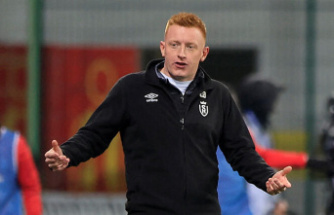It would be a historic first for the FIFA World Cup: in 2030, the competition could be played on two continents, Europe and Africa. On March 16, during the congress of the International Football Federation (FIFA) in Kigali, Morocco announced that it was officially a candidate alongside Spain and Portugal.
This common approach, stimulated by the expansion of the competition from 32 to 48 teams from 2026 and therefore by an increasing need for infrastructure, competes with that of four South American countries (Argentina, Chile, Paraguay, Uruguay ). The candidacies of Saudi Arabia, Greece and Egypt should be abandoned, Cairo not wishing to overshadow the Ibero-Moroccan file. So far, the World Cup has only taken place once on the African continent: it was in 2010, in South Africa.
The Cherifian kingdom has already been a candidate for the organization of the tournament five times between 1994 and 2026. Its rallying to the Spanish-Portuguese candidacy has accelerated in recent months while Ukraine, which had considered joining, gave up following its invasion by the Russian army. The kingdom was approached by the two European countries, which probed it to find out its intentions. After his failure for the 2026 edition, he intended to represent his candidacy. "To stage a 48-a-side World Cup, joint bids will become the norm. Morocco could not go there alone, Spain and Portugal either, or with less chance of winning. This candidacy is quite logical, ”explains Jean-Baptiste Guégan, consultant and author of Geopolitics of Sport (ed. Bréal, 2022).
On the diplomatic level, relations between Rabat and Madrid have warmed markedly after Spain aligned itself with Morocco's position on Western Sahara - a reconciliation symbolized by a summit in February in Rabat. “Discussions for the World Cup took place from state to state, intervenes, on condition of anonymity, a source close to the Moroccan sports ministry. King Mohammed VI was approached directly by the Spanish and Portuguese governments, and he agreed. »
Six approved stadiums
“There are also geographical and structural reasons, observes Jean-Baptiste Guégan. The three countries are close, the distances relatively short. As they are also very touristy, they are very well endowed in terms of housing, transport and health. And they have FIFA standard stadiums. This means that the investments to be made to organize a World Cup will not be enormous. It is quite the opposite for the opposing candidacy. Thus, Morocco has six approved stadiums in Casablanca, Rabat, Tangier, Agadir, Fez and Marrakech, and plans to build a new one, with a capacity of 100,000 seats - the largest in Africa -, in El Mansouria, 35 km from Casablanca.
But Spain and Portugal have also turned to Morocco for strategic reasons, in view of the vote which will take place in 2024 for the awarding of the competition. The Royal Moroccan Football Federation (FRMF) has indeed signed, as part of the sports diplomacy promoted by the king in the early 2010s, 45 partnerships with African federations. The weight of Morocco in Africa is real and the official support of CAF suggests that the 53 federations will vote for this candidacy. For its part, the Union of European Football Associations (UEFA) has 55 federations (including Russia, currently suspended).
The most reasonable forecasts therefore suggest that the Ibero-Moroccan dossier could collect 105 or 106 votes in Europe and Africa (candidate countries cannot vote), to which others will be added, particularly in Asia. Enough to make the trio the favorite against the South American candidacy, and this while Gianni Infantino, the president of FIFA, would welcome the World Cup, for its centenary, returning to its original lands - the first edition, in 1930, had taken place in Uruguay – as he had declared in 2016 during his first campaign for the election. On very bad terms with UEFA, the Italian-Swiss on the other hand maintains excellent relations with the South American confederation, which officially supported him during his re-election in March in Kigali.
While the file will be officially submitted to FIFA in June, the Spanish, Portuguese and Moroccan federations will organize several working meetings in Madrid in the coming days. According to information from World Africa, Spain could host the matches of six groups in the first round, against three for Portugal and Morocco. Fouzi Lekjaa, the president of the FRMF, would like his country to also host the opening match or the final.












